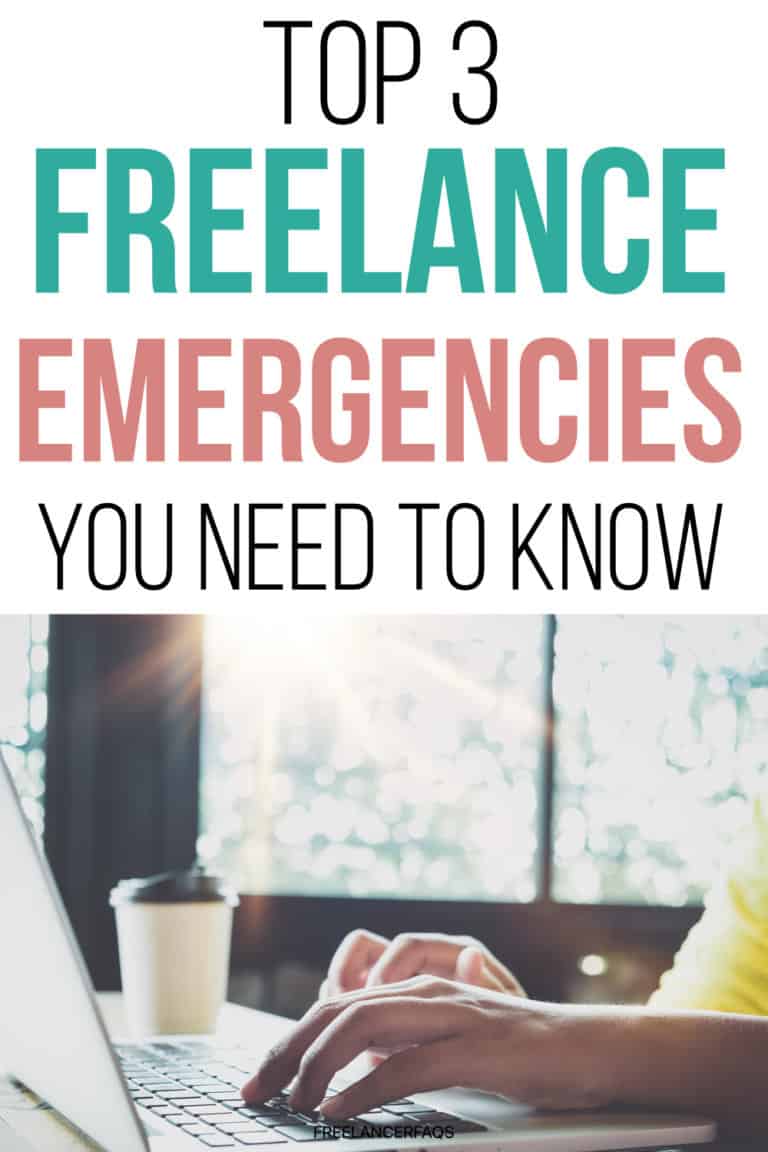Life happens.
Emergencies can occur at any job, even with the best preparations and planning in place.

However, when you’re a freelancer, any kind of emergency can be especially terrifying.
Everything is on your shoulders.
You’re essentially a one-person business, and if something goes wrong, it might feel like everything you’ve worked for could be gone in a flash.
Thankfully, you can protect yourself and your business — even in these situations.
While you can’t prepare for every possible emergency, you can take control over some of the common ones.
With a bit of preparation and the motivation to get back in the game, you’ll move past these emergencies and find success.
Let’s take a look at a few emergencies you run the risk of facing as a freelancer, and discuss what you can do to protect yourself without feeling completely overwhelmed.
1. Internet Outages
Whether you strictly work from home or you tend to be a sort of “digital nomad” traveling to your favorite coffee shops and cafes, you never know when you might run into Wi-Fi issues or internet outages.
While those things can be inconvenient for some people, they can be downright dangerous for freelancers — especially when you’re working on a deadline!
Usually, internet outages are temporary.
However, if you’re dealing with an outage from something like a thunderstorm or winter weather, you might not be able to wait for the connection to be restored.
However, this is when setting up a hotspot on your mobile phone can come in handy.
With a hotspot, you can use the internet at anytime, anywhere — as long as you have your phone nearby.
Additional benefits include:
- It has greater security than public WiFi;
- It’s more reliable than WiFi;
- It’s easy to access with very little time and effort.
Consider contacting your mobile provider or checking your phone to determine how you can set up a mobile hotspot, and you’ll never have to worry about missing a deadline or falling behind due to internet outages again.
2. Clients Aren’t Paying
As a freelancer, you’ve most likely fostered close, professional relationships with your clients.
Doing so fosters loyalty and trust, and makes it easier to rely on consistent income each month.
Unfortunately, that’s not always easy to do, especially when you’re just starting.
The harsh reality is, sometimes clients don’t pay right away, even after you’ve sent an invoice (and reminders).
You might rely on every payment to cover your monthly budget, so even one client not paying their invoice can feel like a disaster.
If a client hasn’t paid their invoice and you’ve gently reminded them more than once, don’t hesitate to take action and protect yourself for the future.
That might include steps like:
- Immediately halting all work for that client;
- Offering a payment plan if they’re short on funds;
- Threatening legal action;
- Reporting to the Better Business Bureau.
 No matter what, you always deserve fair compensation for your work.
No matter what, you always deserve fair compensation for your work.
If a client doesn’t pay because they’re unhappy with your services, consider how you can fix things before taking extreme measures.
But, if they seem to have “vanished” and won’t respond to multiple requests, never feel guilty about taking action to get what you deserve.
3. Personal Health Issues
Again, as a freelancer, you’re a one-person business.
That means you really can’t afford to take as much time off as you might want.
Everyone gets sick from time to time, and taking a day off to rest and recover is important, but what happens if you’re dealing with a personal crisis or you’re feeling completely burnt out and finding it impossible to stay on task?
Sometimes, actions are out of our control.
At some point, you’ll have to drop all of your work and take care of a personal crisis.
In these cases, having an emergency fund is a great idea for freelancers. It doesn’t have to be much – just enough to help you get through a few weeks or months without having to stay glued to your work.
You might not be able to prevent every physical or mental health crisis, but you can stay proactive and take care of yourself. Self-care as a freelancer isn’t selfish or lazy – it’s essential.
Take stock of your mental health needs and pay attention to how you’re feeling.
If you’re regularly sad, confused, struggling with worry, or experiencing extreme mood conditions, you could be on the brink of burnout.
While you may not be able to afford weeks without work dedicated to taking care of your well-being, you can practice self-care regularly to boost your mental (and physical) health. Some examples include:
- Prioritizing sleep;
- Eating a healthy diet;
- Building hobbies you enjoy;
- Setting personal and professional boundaries;
- Fostering healthy relationships;
- Staying physically active.
Self-care can make a big difference in your personal and professional life, so prioritize it and decrease the risk of major emergencies in the process.
Emergencies are unpredictable and can leave you feeling overwhelmed or even scared, especially when you’re running your own business as a freelancer.
Keep these ideas in mind to handle some common issues you might face, so you can stay calm while keeping your business afloat.



Leave a Reply